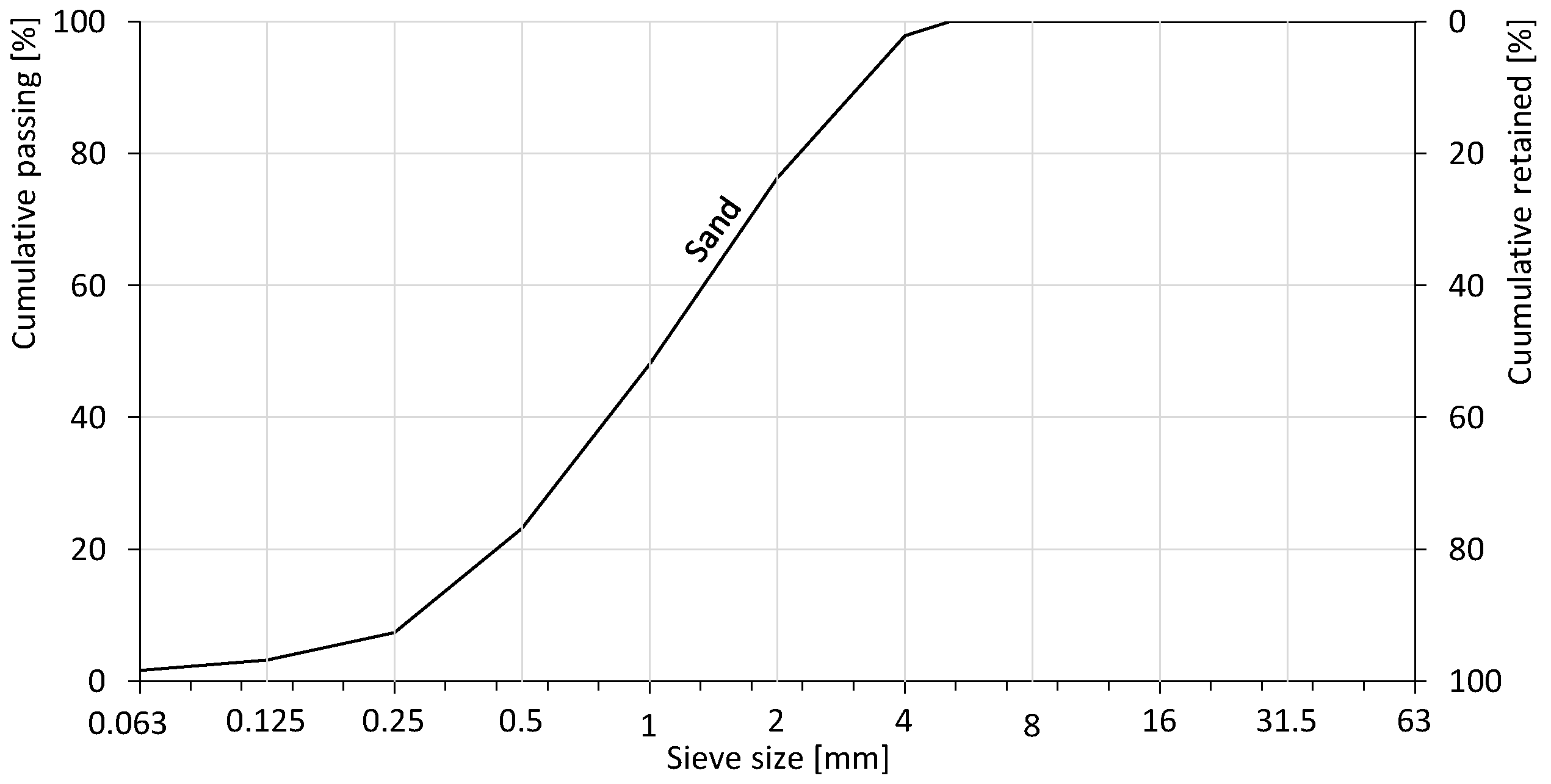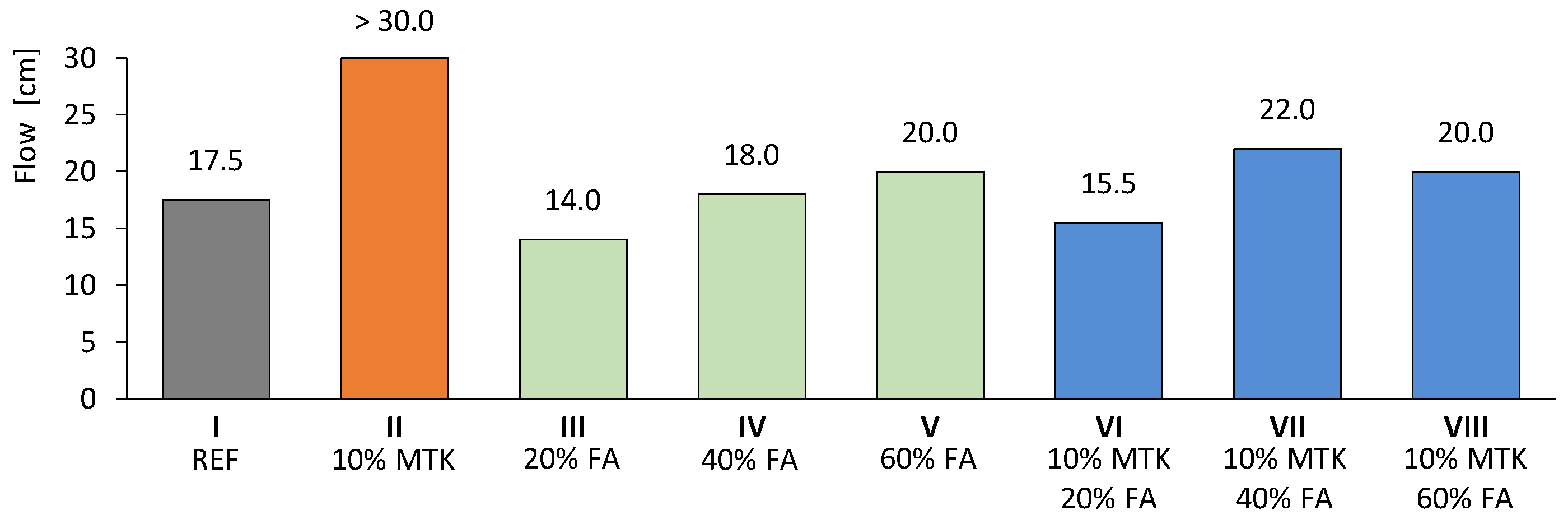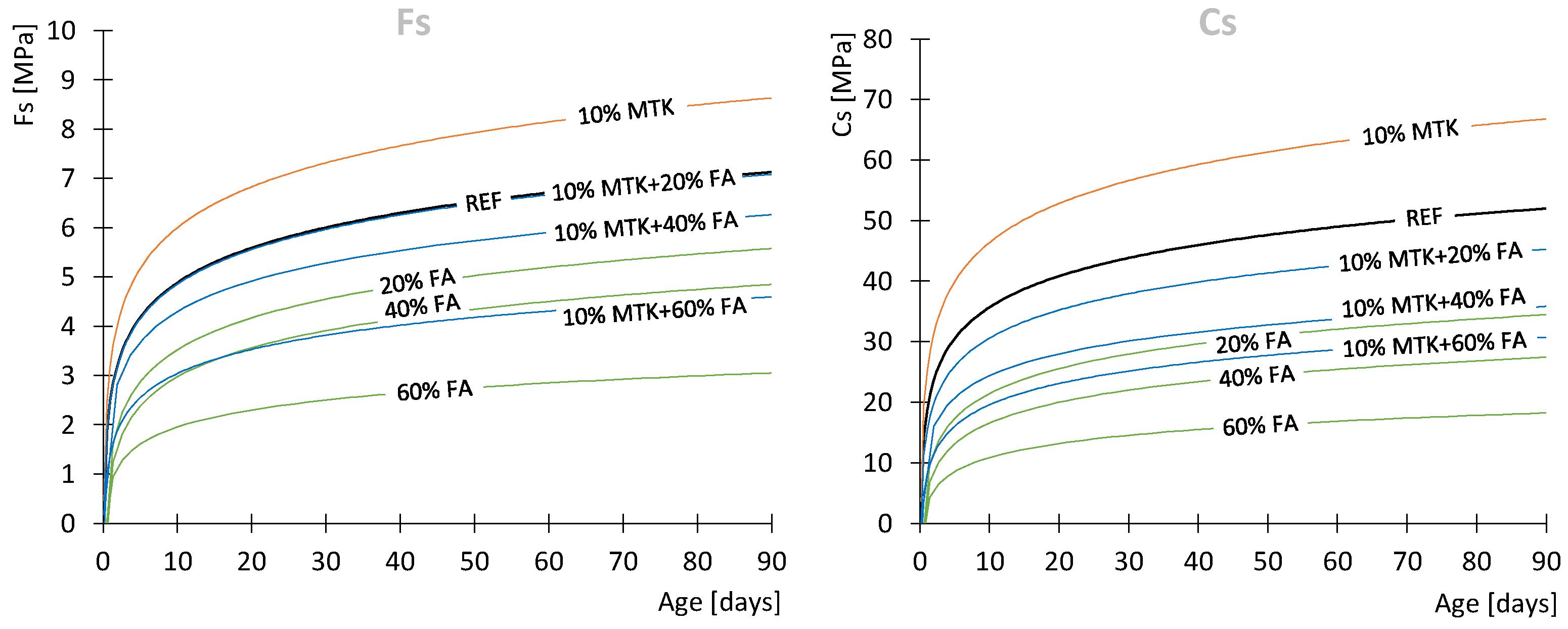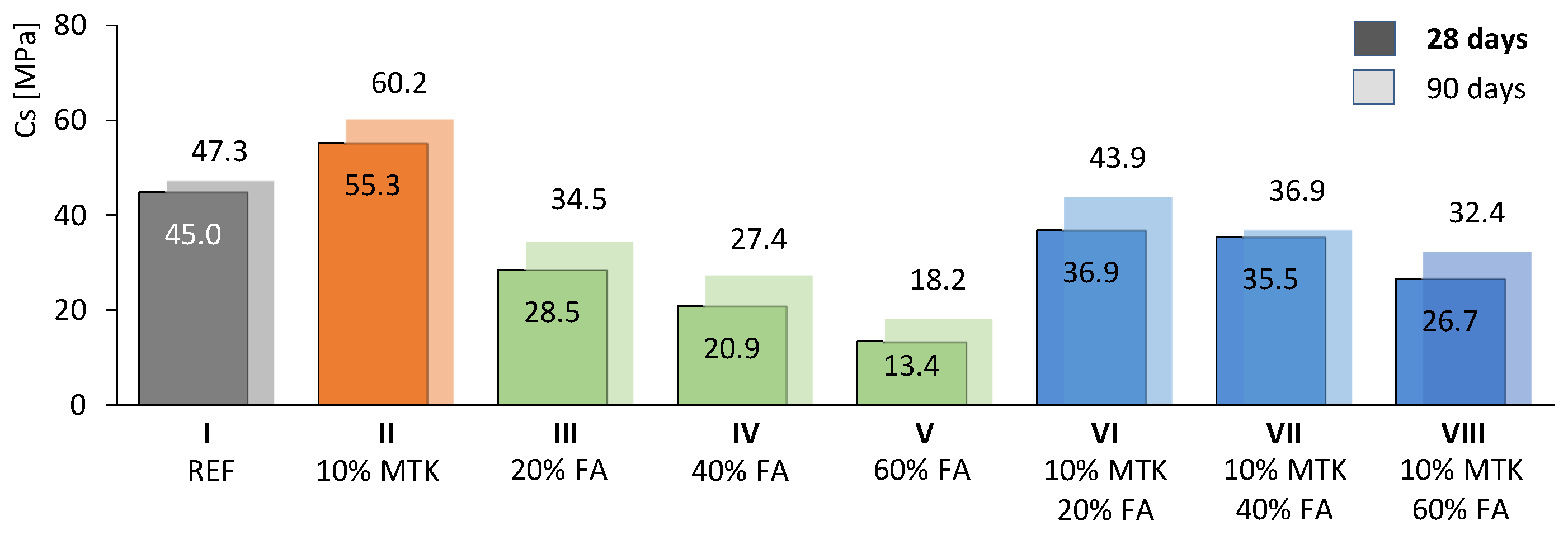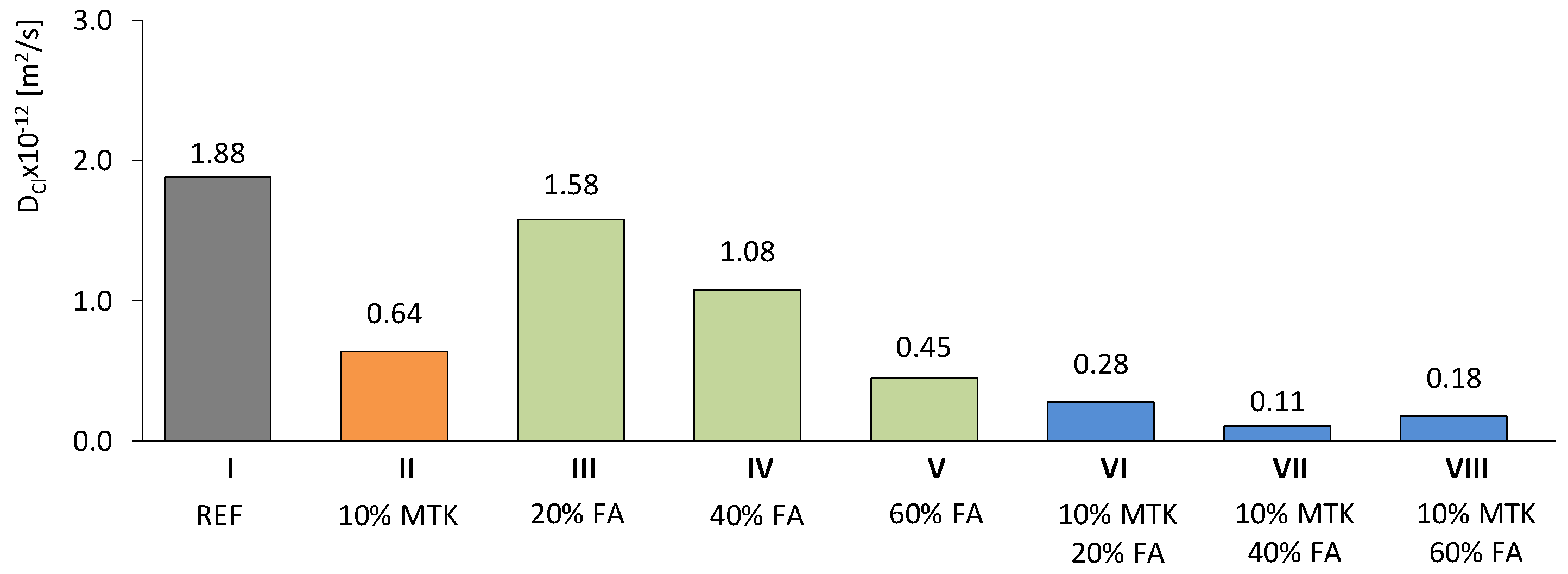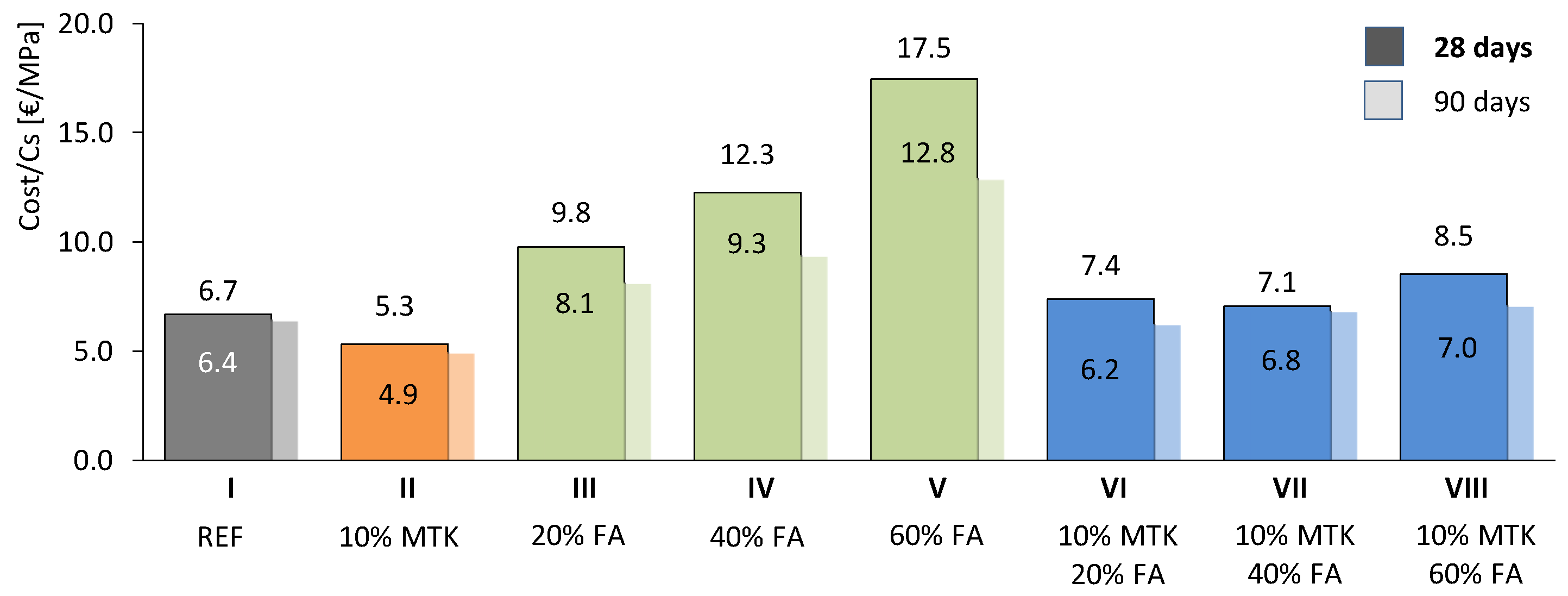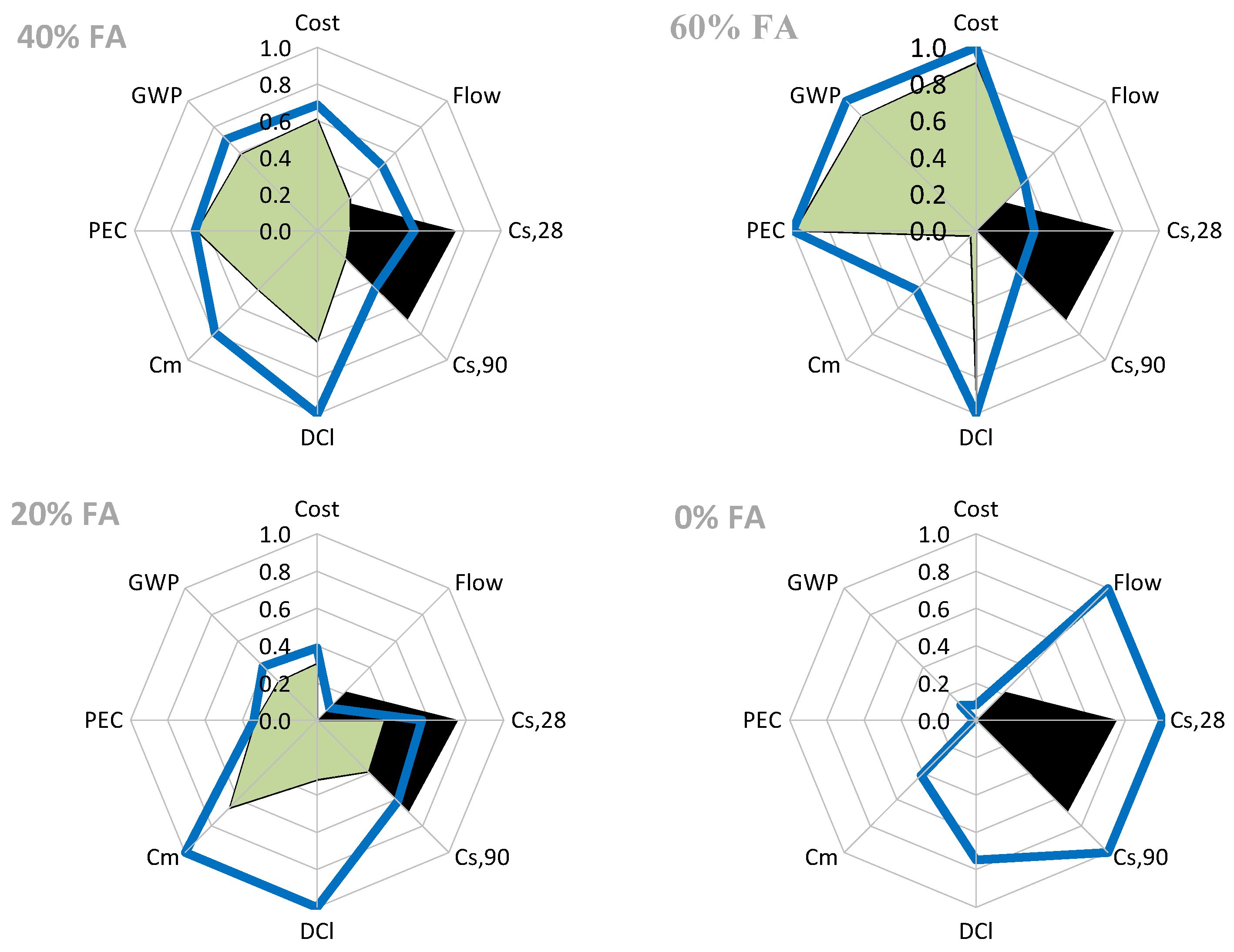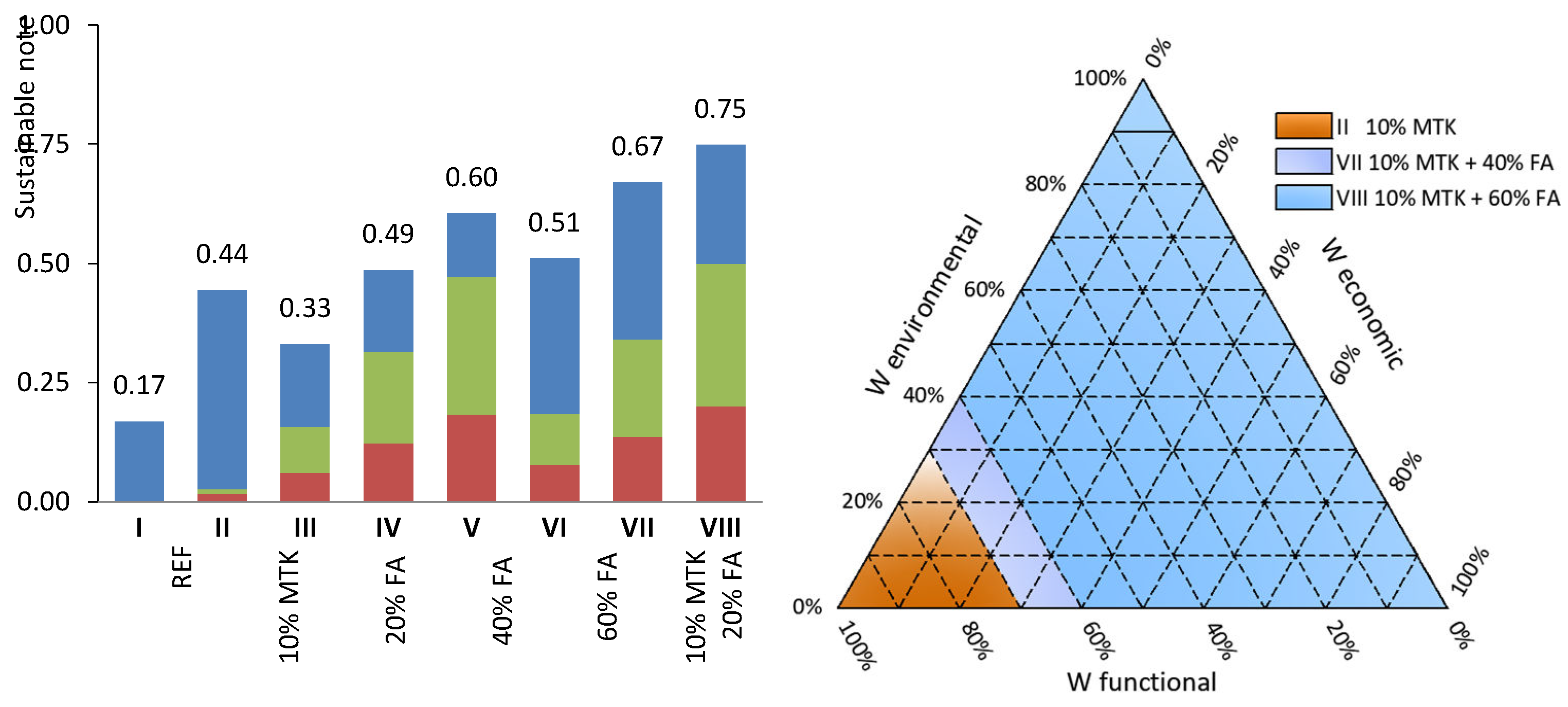1. Introduction
Cement is a product that plays a major role in climate problems. The second most consumed product by humans (after water) is concrete, which main component, cement, accounts for about 7% of CO
2 emissions to the atmosphere. Limestone calcination accounts for approximately half of the CO
2 emissions released in cement production. Using less cement when adding additions can undoubtedly reduce the environmental impact. For these reasons, the incorporation of mineral additions in concrete is essential, both environmentally and economically [
1,
2,
3,
4,
5,
6,
7].
Furthermore, the problems caused by cement have been getting worse. To illustrate a few examples: the speed of global construction and development; the rapid growth of the economies of countries such as China and India; the deadlines for consumption are getting faster; the constant waste in the rapid and inefficient conception of materials; the evolution of the world's population, with a population explosion of 9.7 billion inhabitants, located mainly in urban areas; as well as the short-term perspective of environmental costs [
8,
9,
10,
11,
12,
13]. The environmental problems associated with cement are made worse by these factors.
The identification of key elements is crucial for reducing cement dependence. These may include reducing cement consumption, careful use of this material, reducing the cement/clinker ratio, and the use of increasingly efficient blends. In this case we are mainly trying to focus on these last two aspects: substitution of the construction and technological development of ternary blends for incorporation into concrete.
To achieve this, two additions were used: fly ash and metakaolin. By using fly ash, blends can be produced with less cement. Additionally, there are other benefits that are known, both during the initial stage and during the finished product [
14,
15]. In order to maximize the environmental benefits, it is important to replace as much cement as possible. But this may not be feasible due to the disadvantages of using fly ash, such as slow pozzolanic reactions, low resistance at younger ages, and more careful curing.
This is where metakaolin comes into play. The expectation is that it will reduce or reverse some of these disadvantages. Namely correct the initial low resistances. It is expected that one can be produce blends with a large volume of mineral additions and with mechanical behaviour similar to that of conventional concrete, or even improved. Regarding durability, the incorporation of these blends generally results in a denser and higher performance concrete, enhancing its durability indicators.
In summary, the main vectors that can justify the use of ternary mixtures are:
Produce concrete by using a significant amount of fly ash. Thus, large volumes of the traditional binder were substituted by this industrial by-product, which otherwise would have to be stored in landfills, and may also be a source of pollution;
Concrete’s compactness and durability are enhanced by these fly ash contributions. Although eventually the effect will only be felt in the long term due to the slow pozzolanic reaction. The workability of these additions is also enhanced;
Produce concrete with a very low W/C ratio, with workability controlled by the use of superplasticizers. This can lead to even more compact, stronger, and durable concrete;
Introduce metakaolin to ensure the initial resistances necessary to make this concrete competitive in current construction. In addition, the use of metakaolin can contribute to an increase in the strength and durability of concrete due to its high reactivity and fineness.
In this context, an experimental program with mortars was developed. It encompasses the characterization of the performance of ternary mixtures, where significant volumes of cement were replaced by fly ash, and metakaolin. Mechanical, durability, cost and environmental requirements were evaluated. In the end, global analyses were performed. Finally, global analyses of all obtained results were performed.
Although the focus of this work is concrete, tests were carried out on mortar specimens, since the results can be correlated, as demonstrated in other researches [
14,
16,
17].
2. Materials and Methods
2.1. Materials
2.1.1. Binders
The Portland limestone cement (CEM II/B-L 32.5N), manufactured by a Portuguese company, Cimpor, which includes clinker and limestone filler, was adopted. The manufacturer reports that the compressive strength was 16.0 and 32.5 MPa after 7 and 28 days, respectively (
Table 1) [
18].
The fly ash was obtained from the Pego thermoelectric power plant located in Portugal. These consist mainly of silica (60.87%), alumina (20.40%) and iron (7.82%). There is a total CaO content of 2.72%. The density was 2360 kg/cm
3, and there were 27.30% of fines exceeding 45 μm. Previous research have already characterized fly ash, which is summarized in
Table 2 [
15,
19].
The metakaolin was obtained by thermal activation of kaolin clay extracted from Barqueiros, located in Barcelos Council, Portugal, and named Mibal-C. The sedimentary deposit is comprised of kaolin and sand, and it is estimated to have a brute reserve of millions of tons [
20]. The metakaolin To obtain metakaolin, kaolin was calcined to a temperature of about 700 °C and metakaolin has already been characterized in previous investigations, which are summarized in
Table 3 [
21,
22].
2.1.2. Aggregates
A river sand with a modulus of fineness of 3.44 was employed [
23]. The maximum diameter was set at 4 according to ASTM criteria [
24,
25].
Figure 1 shows the results of the granulometric analysis.
2.1.3. Superplasticizer
GLENIUM 77 SCC from BASF was employed as superplasticizer (SP). It was characterized as a powerful high range water reducer/superplasticizer (T3.1, T3.2 NP EN 934-2: 2003) [
26]. It had a density of 1.05 +/- 0.02 g/cm
3. The maximum content of chlorides and alkyls was less than 0.10 and 0.35%, respectively. According to the manufacturer, it is recommended to take 1.5% of the binder mass.
2.2. Methods
The experimental program was designed to study mortars. For the composition of the samples, eight mortars were used, with the addition of cement (CEM), fly ash (FA) and metakaolin (MTK) (
Table 4). As a starting point, a reference mortar was made solely with cement (I). Subsequently, mortars mixed with cement and an addition: 10% MTK (II), 20%, 40% and 60% FA (III-V). Finally, ternary mixtures, produced with cement, 10% MTK and 20%, 40% and 60% FA (VI-VIII). This table also indicates the total quantities of binder (B = CEM + FA + MTK), sand (S), water-to-bind ratio (W/B) and superplasticizer (SP).
Mortars were produced using a variable-axis electric mixer. Immediately afterward, flow test were carried out [
27]. Then the specimens were moulded. After one day, the specimens were demoulded and placed immersed in water for up to 90 days of age.
Over time, multiple tests were conducted for each mixture. To carry out the flexural strength test, three specimens of 40x40x160 mm
3 were taken for each age: 3, 7, 14, 21, 28, and 90 days [
28]. By using 6 specimens 40x40x ± 80 mm
3 from the flexural test, the compressive strength test was performed. Migration tests were conducted in a non-stationary regime to evaluate the indicators of durability [
29]. Three cylindrical specimens of 50 mm height and 100 mm diameter were used for each mixture, at 90 days of age. Water absorption by capillary was also carried out using 3 cubic specimens with a 50 mm edge for each mixture at 7, 14, 21, 28, and 90 days of age [
30]. To determine the capillary absorption coefficient only the four first test hours were considered.
3. Results
3.1. Workability
The results of the flow test are shown in
Figure 2. The results show atypical values because it was used SP in some mixtures. The use of SP is a result of the low workability of mixtures that contain MTK. This makes mortars drier and less mouldable, trapping water. The low workability during the initial mixing stages is particularly concerning, which can result in a poor evaluation of the use of SP. This is the reason why mixture II (10% MTK) has a result above 30 cm: at an early stage it is very difficult to mix all the components in the mixer; but then the consistency changes suddenly, making the mortar more fluid.
It can be concluded that the workability of MTK is not critical up to 10% incorporation as a CEM replacement. On the contrary, FA results in mortars with increasing workability. These two additions can be complementary in relation to flowability because FA mitigates the disadvantage of using MTK.
3.2. Mechanical Strength
The results of the mechanical strength tests over time, are shown in
Figure 3: flexural strength (left) and compressive strength (right). It has been noted that FA (green lines) can be very detrimental. The higher incorporation of FA, the lower the resistance. This is likely due to the replacement of cement, but also due to slower pozzolanic reactions. On the contrary, the MTK (orange line) enhances resistance at all ages. It reacts very quickly with calcium hydroxide and has high initial strength. When MTK and FA are combined, the ternary mixtures (blue lines) match or exceed the reference (black line). This shows the good synergy between these additions: MTK acts in the younger age range and FA acts in the older age range.
This fact is evident in
Figure 4. This shows the results of compressive strength at 28 and 90 days. At 90 days, the binary blend with MTK (II) has a resistance 27% higher than the reference (I). On the other hand, when FA is incorporated between 20 to 60% (III to V), resistance decreases by 40 to 72%. But when these FA are combined with MTK (VI to VIII), the resistance reduction is only between 22 to 44%. The greater the compactness, the greater the resistance. It is suggested that the MTK produces more compact materials with less voids.
3.3. Chlorides by Migration
The results of the diffusion coefficient of chlorides by migration are shown in
Figure 5. It has been observed that all mixtures with additions (II to VIII) perform better than the reference (I). The best results come from ternary blends with MTK and FA (VI to VIII). Moreover, these mixtures have a very low diffusion coefficient, 88% less than the reference value. This suggests an excellent synergy between MTK and FA. As well, these mixtures can be excellent for structures that are highly exposed to aggressive agents.
3.4. Water Absorption by Capillarity
The water absorption by capillarity coefficients at 90 days are shown in
Figure 6. Binary blend with MTK (II) performs 33% better than reference (I). Binary blends with FA (III to V) also perform better - between 3 and 48% - than the reference. The best results are achieved with ternary blends that include MTK and FA (VI to VII). The performance is 33 to 73% better than the reference. Note that this test is representative of the fulfilment of capillary large pores. And it is concluded that the reference (I) has higher values than the other mixtures. Possibly, because mixtures with additions have smaller pores. This supports the results of chloride diffusion (
Figure 5). As well as some of the results of mechanical strength (
Figure 3 and
Figure 4). The excellent properties of both FA and MTK make this possible. The additions are pozzolanic, producing additional hydration products that result in reduced porosity. On the other hand, these additions act as a filler, which also contributes to the reduction of porosity.
3.5. Cost Analysis
The cost of the produced mortars was determined taken into account only the material costs, without taking into account indirect or life cycle costs, that can be considered similar. SP was not taken into account in the calculation. It is admitted that its cost is included in the price of metakaolin. As can be seen, the price given to metakaolin is on the safe side.
Despite the recent price instability caused by COVID-19, it is known that the price of CEM tends to be competitive. Competitiveness will be expected for future additions that pique interest and demand. In a basket of 41 countries across all continents, the average cement price is around 0.20 €/kg [
31]. The price of MTK varies greatly depending on the place of sale: in China, it is about 3.4 €/kg; while in Germany it is about 0.1 €/kg [
32]. The average value of 0.22 €/kg is believed to be safe for the intended analysis. FA is a scarce product in some parts of the world, mainly in Europe. The global average price is 0.02 €/kg [
33]. Finally, the price of sand is 0.14 €/kg [
34].
Each mixture’s costs were analysed, and the cost/benefit ratio was estimated using the compressive strength at 28 and 90 days. The results are shown in
Figure 7 and it can be concluded that the use of FA in binary blends (III to V) is quite penalizing. However, the ternary blends containing MTK and FA (VI to VIII) have a cost-benefit ratio that is comparable to the reference (I). MTK can be used to correct the FA.
3.6. Sustainability Assessment and Global Vision
As a way to analyse sustainability, a qualitative evaluation methodology was used, called MARS-SC. This consists in evaluating the performance of three indicators that, if properly weighted, make it possible to quantify the sustainability of the studied mixtures, through a final sustainability note [
35]. The first step was to calculate the environmental parameters for each composition, which included the Primary Energy Consumption (PEC) and the Global Warming Potential (WGP). For this purpose,
Table 5 was used. Then, the different parameters studied were normalized according to Diaz-Balteiro’s expression. This allows an evaluation of the “best/worst” type, as shown in equation (1):
represents the normalized result;
the result of our tests;
are the worst and the best results, respectively.
The radar diagrams of
Figure 8 were created using the normalized results. A black is the reference result; a green is the binary blends with FA; and a blue is the ternary blends with MTK and FA. Note that the higher the value on the scale from 0 to 1, the better the performance. The Figure clearly shows that ternary blends have a much better overall performance. Compared to the reference, it is only impacted by mechanical resistances and some workability. Compared to binary mixtures with FA, it is undoubtedly superior.
To make the analysis more quantitative, the results were combined into three main indicators: functional, environmental, and economic (
Table 6). With these indicators it was possible to calculate sustainable grades, assigning several W
Gi weights, according to the degree of representativeness appropriate for each indicator and equation (2). On the left side of
Figure 9, the sustainability notes (SN) are presented with the weights of 30% for the environment, 50% for functionality and 20% for the economy. It is obvious that ternary blends (VI to VIII) have a high sustainability grade for these proportions.
As weighting always presents some difficulties, a three-entry chart can finally be made (
Figure 9-right). One for each indicator, where the composition with the best SN for each combination of weights will be highlighted. The conclusion is that the ternary blends (VII and VIII) present in almost all combinations possess better SN, which indicates exceptional sustainability behaviour. This validates the other findings mentioned above.
4. Conclusions
Based on the obtained results it is possible to conclude that it is feasible to produce eco-efficient concrete with high volumes of cement replaced by FA adding a reduced percentage of MTK. This type of ternary blends allows for better performance, with less incorporation of fly ash. That is, it contributed to mitigate the reduced market availability of fly ash in some parts of the world.
Furthermore, the findings suggest that ternary mixtures play a significant role in reducing the environmental impact caused by cement consumption. These have a mechanical and durability performance that is comparable to or better than conventional blends. At younger ages, metakaolin was used as a correcting or regulating factor in the mechanical performance of fly ash. Thus, mitigating the major disadvantages of using high volumes of fly ash in concrete.
From the point of view of durability against chloride attack, ternary blends with metakaolin and fly ash perform exceptionally well. Achieving this goal is very challenging with current mixtures or conventional w/b ratios. For this reason, it seems to be an excellent solution to use in reinforced concrete structures in areas that are highly exposed to this kind of aggressive agent.
The incorporation of metakaolin could be advantageous in reducing cement in the blends while also significantly increasing the service life of reinforced concrete structures. Thus, promoting a more efficient, more ecological and more efficient construction.
Fly ash may eventually be replaced by other similar pozzolanic additions. As long as it is possible to achieve synergies with metakaolin.
References
- Raisdorfer, J., 2015. Influence of adding or replacing mineral additions to Portland cement: Effects on carbonation, capillary absorption and resistivity of concretes (in Portuguese). MSc thesis. Federal University of Paraná.
- Mohamad, N.; Muthusamy, K.; Embong, R.; Kusbiantoro, A.; Hashim, M.H. Environmental impact of cement production and Solutions: A review. Mater. Today Proc. 2021, 48, 741–746. [Google Scholar] [CrossRef]
- Lagerblad, B., 2005. Carbon dioxide uptake during concrete life cycle – State of the art. Stockholm.
- Wang, X.-Y. Simulation for optimal mixture design of low-CO2 high-volume fly ash concrete considering climate change and CO2 uptake. Cem. Concr. Compos. 2019, 104, 103408. [Google Scholar] [CrossRef]
- Stefanoni, M.; Angst, U.; Elsener, B. Corrosion rate of carbon steel in carbonated concrete – A critical review. Cem. Concr. Res. 2018, 103, 35–48. [Google Scholar] [CrossRef]
- Krithika, J.; Kumar, G.R. Influence of fly ash on concrete–A systematic review. Mater. Today Proc. 2020, 33, 906–911. [Google Scholar] [CrossRef]
- Fantu, T.; Alemayehu, G.; Kebede, G.; Abebe, Y.; Selvaraj, S.K.; Paramasivam, V. Experimental investigation of compressive strength for fly ash on high strength concrete C-55 grade. Mater. Today Proc. 2021, 46, 7507–7517. [Google Scholar] [CrossRef]
- UN, 2019. World population prospects 2019: Highlights. New York.
- ERMCO, 2018. Ready-mixed concrete industry statistics-year 2018. Brussels: ERMCO.
- ASCE, 2021. American Society of Civil Engineering Infrastructure Report Card 2021. Reston, Virginia, United States: ASCE.
- Al-Ameeri, A.S.; Rafiq, M.I.; Tsioulou, O.; Rybdylova, O. Impact of climate change on the carbonation in concrete due to carbon dioxide ingress: Experimental investigation and modelling. J. Build. Eng. 2021, 44, 102594. [Google Scholar] [CrossRef]
- NOAA. Global greenhouse gas reference network: Trends in atmospheric carbon dioxide. In Mauna Loa; 2020. Available online: https://www.esrl.noaa.gov/gmd/ccgg/trends/global.html (accessed on 8 January 2021).
- Izumi, Y.; Lizuka, A.; Ho, H.-J. Calculation of greenhouse gas emissions for a carbon recycling system using mineral carbon capture and utilization technology in the cement industry. J. Clean. Prod. 2021, 312, 127618. [Google Scholar] [CrossRef]
- Camões, A., 2002. High performance concrete with incorporation of fly ash (in Portuguese). PhD thesis. University of Minho.
- Reis, R., 2022. Influence of the addition of hydrated lime on the carbonation of high volume fly ash concretes (in Portuguese). PhD thesis. University of Minho.
- amões, A., Aguiar, B. and Jalali, S., 2005. Estimating compressive strength of concrete by mortar testing. In: Sérgio Lopes, Isabel Pinto, Luís Bernardo, Luíz Oliveira & Ricardo Carmo, International Conference on Concrete for Structures - INCOS’05. Coimbra, Portugal, July 7-8.
- Joseph, J. D., Mortar Testing for Estimating Strength. Concrete International, 21(9).
- CIMPOR, 2022. Portland-limestone cement: CEM II/B-L 325 N (in Portuguese). Lisbon.
- Pegop (2013) Fly ash from the Pego thermoelectric plant: Self-control (in Portuguese).
- Pinto, A. T., 2004. Binding systems obtained by metakaolin alkaline activation (in Portuguese). MSc. University of Minho.
- Ferraz, E., C.S.F, G. and P, W., 2008. Kaolins of North-West Portugal (in Polish). Materiały Ceramiczne, 60, pp.58-63.
- Reis, R., 2009. Eco-efficient concretes incorporating fly ash and metakaolin (in Portuguese). MSc thesis. University of Minho.
- IPQ (2000) NP EN 933-1:2000; Tests for geometrical properties of aggregates. Part 1: Determination of particle size distribution. Sieving method (in Portuguese). Caparica, IPQ.
- Faury, J., 1958. Concrete: Influence of its inert components, rules to adopt for its best composition, manufacture and transport on construction sites (in French). 3rd edition ed.: Dunod.
-
ASTM (2001) C33/C33M; Standard specification for concrete aggregates. West Conshohocken, ASTM International.
-
CEN (2003) NP EN 934-2:2003; Admixtures for concrete, mortar and grout. Part 2: Concrete admixtures - Definitions, requirements, conformity, marking and labelling (in Portuguese). Brussels, CEN.
-
CEN (2004) EN 1015-3: 2004; Methods of test for mortar for masonry - part 3: determination of consistence of fresh mortar (by flow table). Brussels, CEN.
-
IPQ (2006) EN 196-1:2006; Cements test methods. Part 1: determination of strength (in Portuguese). Caparica, IPQ.
-
LNEC (2024) E 463-2024; Determination of the diffusion coefficient of chlorides by a non-stationary migration test (in Portuguese). Lisbon, LNEC.
-
CEN (2002) EN 1015-18:2002; Methods of test for mortar for masonry - Part 18: Determination of water absorption coefficient due to capillary action of hardened mortar (english version). Brussels, CEN.
- Globalproductprices.com (2023) Cement - prices by country, around the world, December 2023.
- Chemanalyst (2023) Metakaolin Price Trend and Forecast.
- Chemanalyst (2023) Fly Ash Price Trend and Forecast.
- Globalproductprices.com (2023) Sand - prices by country, around the world, December 2023.
- Mateus, R. and Bragança, L., 2006. Construction technologies for building sustainability (in Portuguese). Ermesinde: Edições Ecopy.
- Cassagnabère, F.; Escadeillas, G.; Mouret, M. Study of the reactivity of cement/metakaolin binders at early age for specific use in steam cured precast concrete. Constr. Build. Mater. 2009, 23, 775–784. [Google Scholar] [CrossRef]
- Isaia, G.C. and Gastaldini, A. L. G., 2008. Environmental and economic perspectives of concrete with high levels of mineral additions: A case study (in Portuguese). Ambiente Construído, 19–30.
|
Disclaimer/Publisher’s Note: The statements, opinions and data contained in all publications are solely those of the individual author(s) and contributor(s) and not of MDPI and/or the editor(s). MDPI and/or the editor(s) disclaim responsibility for any injury to people or property resulting from any ideas, methods, instructions or products referred to in the content. |
© 2024 by the authors. Licensee MDPI, Basel, Switzerland. This article is an open access article distributed under the terms and conditions of the Creative Commons Attribution (CC BY) license (https://creativecommons.org/licenses/by/4.0/).
